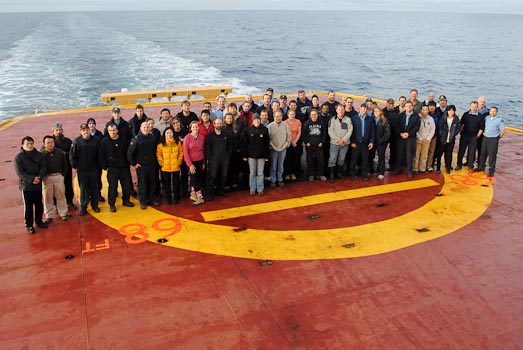Alex KainOctober 15, 2009I came into this trip expecting a cramped, salty-smelling boat with surly sailors and disgusting canned food. Instead, I found an environment that resembled a cruise ship more than my impression of an oceanographic research vessel where everyone was exceptionally nice, anxious to share their stories, and receptive toward my constant questioning. I never could have predicted the constant thundering of the ice or variability of ocean conditions that can be experienced in the Arctic in the span of one day. Some mornings we would wake up and the sun would shine in an endless blue sky, but then by lunchtime (called dinnertime on the ship, as I soon learned), clouds engulfed the Louis in a snowstorm. What surprised me the most, and I think the memory that will last with me the longest, is how exceptionally happy everyone on the boat seemed, everyone from the captain to the cooks to the scientist running repetitive tests all day. The happiness manifested as the deckhand who always, always, smiled and asked me how I was doing when walking down the hall, the researcher who shouted with delight when she her data evidenced the presence of an eddy in a previously unknown place, and the Cadets who, despite sometimes having to sweep and clean crankshafts all day long, always came off like a genial set of cousins rather than people who had to sweep and clean crankshafts all day. I attribute this sense of happiness to a few principal factors. 1. The scientists and crewmembers aboard the Louis want to be in the Arctic. Some people on the ship have known from the time they were children that they wanted to study sea ice. Others joined the Coast Guard for purely practical reasons, but now couldn’t imagine any other lifestyle. 2. People feel lucky to be up here. Few ships in the world can traverse this seascape—you can't just buy a plane ticket to the middle of the Beaufort Sea or sign up for some Carnival cruise to an ice-covered ocean. It's a critical time to be in the Arctic and we are the privileged few who get to know and explore it. 3. The sea is an open, free place that simplifies your life. As one chemist pointed out to me early in the trip, being on a research vessel with no cell phone reception, limited internet, and no one other than fellow scientists and crewmembers offers the rare chance to do something without distraction. On the ship, you can completely devote yourself to whatever you're doing, whether it's running nutrient samples or jogging on the treadmill. When you're here, you don't need to worry about what you're going to cook for dinner, when you're going to pick up the dry cleaning, that party you really should attend, or, for those who have children, the infinite number of preoccupations that arise every day for parents. 4. A sense of deference pervade everyone's perception of the Arctic. Everyone acknowledges that the Arctic is a powerful, extreme, potentially deadly environment where you'd be challenged to survive for more than an hour if unprepared and stranded. This sense of respect is a little humbling, and it affects everyone on board. The result of this is the diminishing of ego and, more palpably, a fantastic and friendly social atmosphere. We all sort of depend on each other in order to survive up here. Never did I feel awkward or intimidated going to anyone on the ship. The Louis boasts a truly supportive community. 5. People here work with their hands. Physical labor shows short-term, measurable rewards that translate into a sense of satisfaction. Being able to say "Today I installed an Ice-Tethered Profiler that will monitor ocean conditions over the next year" is a lot more gratifying than thinking about your largest accomplishment at work and only being able to think about a funny one-liner you included in an email to your boss or that you finished an entire crossword puzzle on the train while commuting home. A quote from Moby Dick has been in the back of my mind throughout this trip. When the narrator Ishmael slips into his cold shipboard bed, he remarks on how one knows a feeling only through that feeling’s antithesis. "To enjoy bodily warmth," he says, "some small part of you must be cold, for there is no quality in this world that is not what it is merely by contrast." For Ishamel, knowing the experience of warmth allowed him to know that he felt cold while in bed. I thought of this quote not only when I was out on the deck, unable to feel my face, and constantly scrubbing snowflakes from my camera, but more often when I reflected on this ship's environment as a whole. I think the main reason people love this environment and do all they can to create a community is because they know, through contrast, how good it is. Everyone on board knows potential alternatives: a dreary suburban office building, commuter trains, friction burns on your neck from uncomfortable starched collared shirts; repetitive tasks performed while sitting at an office chair all day; speaking on phones more than with people; and a complete detachment from the work you are performing that leaves you pressing the snooze button every morning, wondering how many times you'll press it until you call in sick. My experience on the Louis will now be a baseline for this contrast. I will always regard my time up North with fondness and a smile.
Last updated: October 7, 2019 | ||||||||||||
Copyright ©2007 Woods Hole Oceanographic Institution, All Rights Reserved, Privacy Policy. | ||||||||||||



